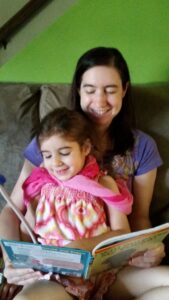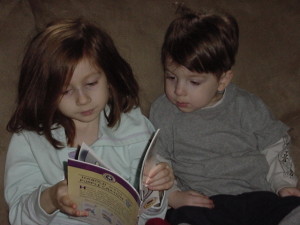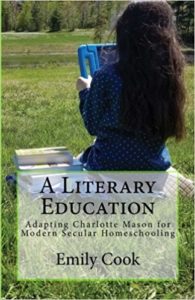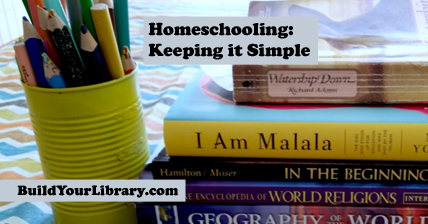Homeschooling: Keeping it Simple
September 11, 2017
I remember when I first started homeschooling. My oldest was four, and I excitedly poured over dozens of homeschool catalogs. There were so many options and all of them seemed necessary if I wanted to have a well-rounded student. So, I bought way too many things and didn’t even use half of them. This same scenario would play out year after year until I finally had an epiphany.
I don’t need to cover everything every single year.
Let that sink in, because it took me a while to really let myself believe it. But it’s true. You don’t need to cover every single subject every year.
One of the things I adore about the Charlotte Mason style of education is that you can present your children with a wide array of beautiful ideas, with short lessons, and in a way that connections are easily made. We don’t need to spend hours studying grammar and spelling and handwriting and reading comprehension and vocabulary and writing every year, because we can cover those things through reading, narration, copywork, and dictation. That doesn’t mean that we never have to study grammar in-depth – but you certainly don’t need to every year. We can let literature, science, history, and art blend together as one easily flows into the other. To me, this style of learning just makes sense.
 One of the things I often hear from people is that they aren’t sure if they are doing enough. How does one define “enough?” When I look at a typical course of study for each grade level, it can be intimidating. There is just so much there! And when it comes to science and social studies especially, the subject matter can seem choppy and scattered. How can one teach all of those subjects within a cohesive framework? This type of homeschooling leads to a long list of items that must be checked off each day. It leads to tedious busy work and overwhelmed mothers trying to make sure they cover everything.
One of the things I often hear from people is that they aren’t sure if they are doing enough. How does one define “enough?” When I look at a typical course of study for each grade level, it can be intimidating. There is just so much there! And when it comes to science and social studies especially, the subject matter can seem choppy and scattered. How can one teach all of those subjects within a cohesive framework? This type of homeschooling leads to a long list of items that must be checked off each day. It leads to tedious busy work and overwhelmed mothers trying to make sure they cover everything.
Rather – I look at the overall goal: what do I want to cover over the course of their school years? What do I want them to care about? What books do I want them to read? What’s important to my individual child? There is no one-size-fits-all when it comes to education! When you look at their education as a whole – everything makes more sense. The pieces all fit together, like a puzzle.
So what does a simplified Charlotte Mason-style education look like?
Literature is the foundation – reading great books can fill your child’s mind with ideas, leading down rabbit trails into other subjects. Reading a wide variety of great books will set the tone for your schooling. Your child will narrate what they read – first orally and eventually in writing, leading them to learn to craft essays and begin to analyze literature. They’ll learn vocabulary in context and use passages from literature as copywork and later dictation.
You study history chronologically so that you can begin to see the flow of centuries and how one event leads to another. We aren’t memorizing dates and names, we’re watching the pageant of time unfold before us, finding out about the people that really lived and how they changed our world. You’ll learn geography as it pertains to history, watching empires rise and fall, and seeing how the maps change over the course of time. You’ll get a glimpse of life in other cultures through beautiful stories and well-chosen documentaries and movies.
Art and literature both tie into your history – you’ll see the art that came out of the turbulent times in which the artists lived, and read books that will allow you to “visit” those time periods.
You’ll focus on only one or two science topics per year, really digging in and exploring with well-written books, fascinating documentaries, and enlightening experiments.
With this type of schooling, you’re using the best resources so that while you aren’t checking off endless boxes each day, you’re still giving your children a powerful and thorough education. Each piece of the puzzle brings its value and worth to the table. There is no busy work to “get through.” Your child’s time is more important than that.
 When you simplify – you give your child freedom. You can do your lessons in the morning and leave your afternoons open to explore, to play, to daydream. You’ll give your children time to try new things, time to just be. In this world of rush, rush, rush, it’s a real gift to allow our children that space to just breathe.
When you simplify – you give your child freedom. You can do your lessons in the morning and leave your afternoons open to explore, to play, to daydream. You’ll give your children time to try new things, time to just be. In this world of rush, rush, rush, it’s a real gift to allow our children that space to just breathe.
So yes, mothers, you are doing enough. You are giving your children a beautiful education, filled with ideas, and heroes, the poetry and lyricism of language, and exploration of the world around them. You’re giving them the freedom to imagine and explore. What could be more important than that?
See Related Articles: Can I Combine My Children in One Program?
For more simplified homeschooling – check out Build Your Library’s full-year curriculum guides – Level 0 – Level 1 – Level 2 – Level 3 – Level 4 – Level 5 – Level 6 – Level 7 – Level 8 – Level 9 – Level 10 – Level 11 – Level 12 as well as our wide variety of literature based Unit Studies
 Emily Cook is the author and creator of the secular homeschool curriculum Build Your Library, a literature-based K-12 program infused with the teachings of Charlotte Mason. She writes full year lesson plans as well as shorter topical unit studies. Emily has been homeschooling her four children in Southern NH for 21 years. She is passionate about reading aloud to children of all ages and loves to share her love of literature with others. She and her family also makes incredibly dorky videos about homeschooling, books and more on Youtube at ARRRGH! Schooling. You can follow her on Facebook, Twitter and Pinterest. You can also check out her author page on Amazon.
Emily Cook is the author and creator of the secular homeschool curriculum Build Your Library, a literature-based K-12 program infused with the teachings of Charlotte Mason. She writes full year lesson plans as well as shorter topical unit studies. Emily has been homeschooling her four children in Southern NH for 21 years. She is passionate about reading aloud to children of all ages and loves to share her love of literature with others. She and her family also makes incredibly dorky videos about homeschooling, books and more on Youtube at ARRRGH! Schooling. You can follow her on Facebook, Twitter and Pinterest. You can also check out her author page on Amazon.

